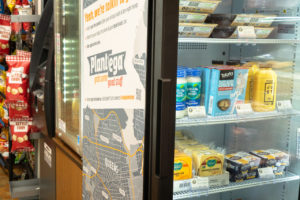Hot Off the Plant-Based Presses! A new survey from Vegan Strong reveals that a third of Americans think we’ll all be meat-free by 2039 – that’s just 18 years away!
We’re excited to share their findings, to help others better understand opportunities and actions needed to help make this a reality, and how plant-based eating has surfaced as a silver-lining to the pandemic. Dig in!

A survey of 2,000 Americans revealed the average person thinks we’ll all be meat-free by 2039 – that’s just 18 years away.
While many have high hopes for the future over half of respondents (52%) don’t think going on a plant-based diet is a “realistic possibility” for them right now.
Of those wary to make the switch, one in five (22%) said plant-based diets are too expensive and 19% think it would be too time-consuming to learn the ins and outs.
Sixteen percent blamed their local stores for not providing enough options to support a vegan lifestyle.
The study conducted by OnePoll on behalf of Vegan Strong found 55% worry they couldn’t survive on a vegan diet based on the amount of protein they think they need.

Misconceptions about protein and plant-based lifestyles abounded. Only one in three respondents knew two cups of cooked lentils was equal to the same amount of protein in a 5 oz steak.
In spite of their misconceptions respondents have been attempting to make healthy lifestyle changes since the pandemic began even though they haven’t gone according to plan.
The average person has tried to swap out their foods with healthier alternatives six times and failed an equal amount of times.
Even though the experiments have not been a success one in two (51%) count trying new foods as one of the few exciting highlights of the pandemic.
Fifty-two percent revealed the boredom they’ve felt in the pandemic has pushed them to try foods they never thought they would.
Some of the things respondents tried for the first time since March 2020 include aloe juice, cauliflower products (rice, pizza crust), dragon fruit, eggplant, tofu and kimchi.
Respondents aren’t undertaking these culinary expeditions alone as 60% of those who live with others credit new food traditions for expanding the palates of the people they live with.
According to Robert Cheeke, Vegan Strong National Tour Director, “Most people don’t realize that plants have all the protein you need, yet many elite athletes are converting to a plant-based diet because they are seeing their performance and strength improve dramatically.”
The extended time at home due to the pandemic has allowed respondents to dip their toes into all sorts of dinner-making challenges.
Fifty-four percent have made a game of cooking with whatever they already have at home while three in ten (29%) have eaten around the world by trying different cultures’ cuisines.
One in five have attempted a gluten-free dish and 31% have given a vegan recipe a go for the first time.
The spokesperson for Vegan Strong added, “Plant-based eating can be incredibly affordable if you focus on eating fruits, vegetables, beans, rice, nuts and seeds. Going vegan is better for your health, your wallet and the earth.”
FOODS TRIED IN THE PANDEMIC
- Cooking with whatever they have at home 54%
- Vegan/plant-based foods 31%
- Cuisines from other countries 29%
- Embracing cooking as a hobby 22%
- Gluten-free foods 21%
- Sugar-free diet 20%
- Trying more labor-intensive recipes 19%
- Keto diet 15%
Top reasons respondents think going vegan is not realistic for them now
- Too expensive 22%
- Too time-consuming to learn 19%
- Don’t have enough options at the store 16%
- Not skilled enough in the kitchen 13%




